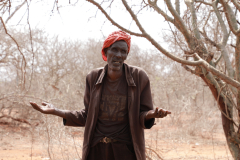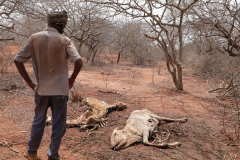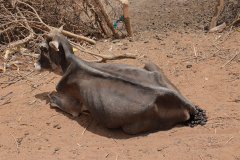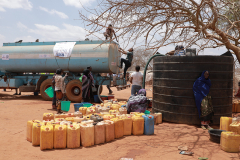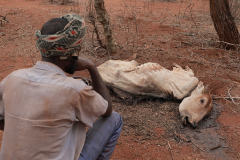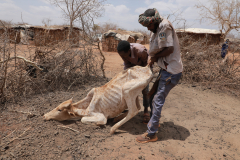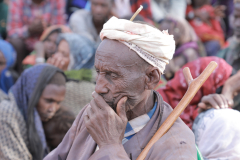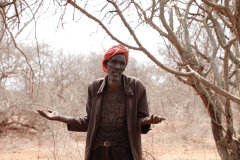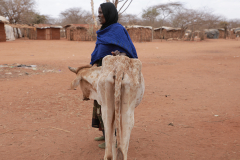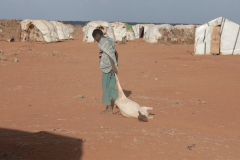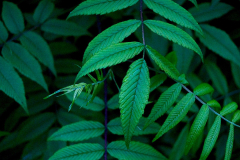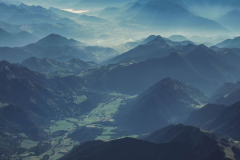Alemayehu Areda (PhD) is an experienced politician who played an active role in Ethiopian politics, beginning with the student movement of the 1960s, which sought to overthrow the feudal system. He was also a member of the Ethiopian People’s Revolutionary Party (EPRP).
Leveraging his extensive experience, Alemayehu founded the Ethiopian Democratic League (EDL), which was once part of the Coalition for Unity and Democracy (CUD)—a major opposition alliance, popularly known as “Qinijit,” formed ahead of the 2005 National Election.
A Chemistry graduate from Addis Ababa University (with both his first and second degrees), Alemayehu later earned his PhD in Biochemistry from the University of London in 1990. In addition, he worked as a university lecturer and associate professor at various institutions, including Addis Ababa University, and served as Dean of Jimma College of Agriculture.
As one of the organizing scholars of the Ethiopian Civil Service University, he also served as its president for four years before voluntarily resigning.
Currently a member of the Addis Ababa City Council, Alemayehu has authored two books—”YeSegon Poletika” and “Mhuru”—which focus on Ethiopian intellectuals, arguing that Ethiopian politics requires genuine commitment and collective engagement from all stakeholders as well as political stability.
In an interview with The Reporter’s Abraham Tekle, Alemayehu addressed Ethiopia’s political landscape, particularly the post-2018 transition, ongoing tensions between the federal government and the TPLF, the upcoming national election, and potential pathways to lasting resolution to the country. EXCERPTS:
The Reporter: In your most recent article, ‘Is Politics Dying as We Know It,’ you discuss ‘the Fading Pulse of Politics.’ Could you elaborate on this concept and explain how it relates to the current political climate in Ethiopia?
Alemayehu Areda (PhD): When I watched the
dialogue between the opposition parties and the Prime Minister, and when I heard their questions and gauged their participation, I didn’t see any kind of opposition on the other side of the Prosperity Party. Most of the opposition are ethnic proxies; they talk of the people without being popular. And the other thing: I didn’t see a vision guiding the Ethiopian political system from the other side. Some [opposition figures] didn’t speak there, but from the ones who did speak, I didn’t get the kind of politics I desire to see in Ethiopia. I want to see a competitive, participatory political situation. I don’t want to see people just reacting to a situation. They were just reacting. So, what I think in politics is a contrasting vision, it’s a contrasting agenda, but am I seeing that, or is politics as I know it dying? That was what I had in mind when I wrote the article.Considering the transitional period in Ethiopian politics that began in 2018, how would you characterize the dynamics of the country’s political landscape today?
Unless we bring the EPRDF into the scene, we will not understand the change that happened after 2018. The EPRDF was not a single party; it was a front. It consisted of four organizations with different names and different programs, but all followed templates supplied by the TPLF. The TPLF acted as the cream on top of the so-called four organizations.
They spoke similarly but believed they were distinct. For example, the TPLF was a liberation front; the Amhara National Democratic party was a Movement, the Oromo People’s Democratic Organization (OPDO) was an organization, whereas the Southern Ethiopian People’s Democratic Movement (SEPDM) was a movement. But they were not equal. Though it was called a front, most decisions were made by the TPLF Executive Committee and then distributed for implementation.
The other thing is that five organizations were considered as ‘aggar’ (partners in the periphery) parties. So, the political system of the EPRDF, based on revolutionary democracy, was exclusive but not inclusive. And when politics becomes exclusive, it is dangerous. The EPRDF never allowed any meaningful opposition into the country. Those so-called opposition parties who participated in elections were effectively puppets of the EPRDF.
Now, coming to 2018: the four parties merged into one. No more four programs, four flags, four mottos, or four names — just one name: Prosperity Party. The same reformers also invited the five ‘aggar’ groups into this new party. Is that not inclusiveness? I’m not saying it is perfect or ideal, but it is different from the EPRDF. All the changes we now see in Ethiopia are the result of this political direction. The Prosperity Party is not ideologized by revolutionary democracy. It follows pragmatic, centrist politics, which is reflected in various documents, including those prepared by the chairman.
This inclusive party also invited individuals from the opposition abroad to return home. Unfortunately, many of them assumed there would be a semi-1990s-style conference where all opposition groups would form a transitional government and share power. But that didn’t happen — because Ethiopia was not disintegrating. There was a government in place. Yes, it had its flaws, but it existed.
So, the EPRDF party members gathered in Hawassa and elected its leader. That leader became the leader of the Prosperity Party. The constitution was not dismantled —it continued, and the reform pushed forward. And again, the opposition from abroad came with their flags and mottos, boarded the leader’s ship, but then found themselves fragmented. They couldn’t even determine which port they were sailing to. Therefore, the inclusiveness, in practice, didn’t work. And that remains one of the major challenges in Ethiopian politics today.
You see, the Ethiopian political system has to capacitate the opposition. The government has to strengthen the political society on the other side — the opposition. Because if the opposition gains any decent level of support, it will provide legitimacy not only to the constitutional setup but also to the ruling party. That is one of the defects. This is the kind of political system we have passed through.
How do these significances manifest within the country’s current political landscape?
To be fair, let’s look at both the strengths and challenges of the system. I prefer to approach it that way.
The political system, as I’ve said, is inclusive. It doesn’t follow revolutionary democracy, as revolution and democracy together are not compatible. Ethiopia needs a pragmatic centrist politics — and that’s why I supported Abiy’s government. Ethiopia cannot afford to siding with any political bloc in the world. It has to remain neutral, pragmatic, and focused on serving its own interests—the interests of the Ethiopian people.
The primary interest of the Ethiopian people is to eliminate poverty. That is the most important thing—poverty and injustice, in every form, must be removed. And to achieve that, the appropriate political approach is pragmatic centrist politics. That has been adopted. As a result, you can observe strengths in the development sector; in energy, agriculture, infrastructure, urbanization, tourism, and so on.
In terms of energy, the Grand Ethiopian Renaissance Dam (GERD) is a prime example. Back in 2018, the GERD was on its deathbed. There is information suggesting that efforts were made to sabotage it when it was handled by MetEC [Metals and Engineering Corporation], a TPLF-affiliated organization. Now, the GERD is completed, enough water has been stored, and power is being generated. This is a significant achievement.
I bring this up because of the diplomatic hurdles Ethiopia had to overcome. The United Nations Security Council met twelve times about the GERD. They haven’t met even three or four times about Gaza, but they met twelve times over Ethiopia. Despite that, the Ethiopian government maintained a peaceful and pragmatic centrist approach. In the meantime, it succeeded in the diplomatic struggle — at the very least, it brought the issue back to being seen as an African matter and that is very important.
Another thing — whenever we talk about agriculture, people often focus only on wheat. Yes, wheat is an important agricultural product, as Ethiopia is now one of the two largest wheat producers in Africa. But does that mean we’ve solved food security? No. We haven’t.
Another area of strength is Ethiopia’s role in regional diplomacy and peace efforts. When Ethiopia signed a memorandum of understanding with Somaliland, it triggered strong reactions from Eritrea, Egypt, and Somalia. But Ethiopia managed to smoothen tensions—largely through the good effort of Turkish President Erdogan—and now the situation is more peaceful. Meanwhile, the Ethiopian army remains in Somalia, supporting the Somali people and government. The problem hasn’t been resolved completely, but Ethiopia’s peace efforts have been highly appreciated.
Moving to the challenges of the current situation — the first major challenge is the spillover effect of the ethnic federal system. Ethiopia continues to face insecurity and sporadic armed conflicts. This is undeniable and needs to be addressed. However, all the problems are a direct spillover from the EPRDF’s revolutionary democracy arrangement.
Ethiopia has faced a series of conflicts, including the war in Tigray and ongoing unrest in the Oromia and Amhara regions, since its political transition. What is your overall assessment of these developments?
When TPLF was legal and active, it violated all the laws of the country and launched a devastating war, in which probably hundreds of thousands of people died. That was the TPLF standing against the Prosperity Party. They wanted to bring back revolutionary democracy. They aimed to restore their old method of rule—but they failed. Fortunately, they were defeated.
Now, the rogue elements of the TPLF, which itself is already dead, are acting outside the constitutional framework. They do not recognize the law. They see the Pretoria Agreement as their constitution. They refuse to follow institutional mechanisms, such as the rules of the National Electoral Board. They behave as if they are equal to the federal government. But now, they are cancelled and no longer exist. They are dancing now to Eritrean songs.
However, what’s happening in the Amhara region is more dangerous. In the Amhara region, there are real grievances. These grievances have accumulated over time, stemming from the previous system. They need to be addressed carefully. The people must be encouraged to come to the roundtable for discussion. They need to present their case, because people are dying there. Schoolchildren are not attending school and health facilities are being destroyed.
As for the TPLF—or rather, the Tigrayan issue—it is the Tigrayan people who are on the losing end. They are now divided. There is a legal organization called the ‘Simret’ party, and there is another group of people gathering informally, as there is no TPLF-led transitional administration in Tigray. The transitional administration is led by a man named Tadesse Werede. He has signed a document agreeing to lead Tigray’s transition into democracy — but the TPLF as an organization no longer exists and has no legal status. So, the responsibility of the regional transitional government is to work with the federal government and support the Tigray people.
Moreover, across all of Ethiopia, there is no other ethnic group that has lost as much as the Tigrayans. They didn’t benefit—not during the time of those who were in control of the power, and they are not benefiting now. The Tigray regional administration must work closely with the federal government to return displaced people to their homes and move the region toward democracy. If there are other regional issues, they should raise them with the federal government. They should come forward and join the national dialogue. That is what is expected.
As for the rogue elements—those who have distanced themselves from the Tigrayan people and are now aligning with Eritrea—I expect nothing from them. This is my position.
Given the trend of achieving political control in Ethiopia through armed struggle, do you believe this approach is effective and beneficial for achieving desired societal change and establishing legitimate governance?
Mind you, the barrel of the gun has ceased to be a means to any solution. It has been considered as the worst method. It doesn’t bring any democracy at all. We learned that even before a similar situation happened in this country. There are similar armed struggles conducted in many other countries that lasted for decades. This is because armed struggle was considered as a successful means to control power. We saw this during the TPLF and Shabia’s armed struggle era. That happened because the world was divided into two ideological zones.
During the Cold War era, the United States frequently supported armed groups with weapons and intelligence to counter the Soviet Union, enabling these proxy forces to achieve their objectives. However, this strategy is no longer viable in the current global landscape.
Another critical point is that armed struggle in Ethiopia is unlikely to succeed today. The people are now more aware and, importantly, armed themselves. Take the Somali region as an example: it has its own well-organized militia and operates with a high degree of autonomy. If an armed group were to attempt an insurrection in Addis Ababa, do you really believe the Somali or Oromo forces would accept it? Such tactics are simply obsolete in today’s Ethiopia.
As the Prime Minister has indicated, such conflicts could lead to widespread casualties and national destruction, yet no armed force can successfully seize power in Addis Ababa. This is not only impossible but also an outdated concept. Despite this reality, some individuals unfortunately pursue this path, even though they haven’t yet managed to liberate any territory.
Ultimately, current armed struggles in Ethiopia are a regrettable and misguided outcome of social media propaganda, often undertaken for profit. My assessment is that these groups are now primarily driven by financial gain, fighting for financial shares among themselves.
Do you see third-party involvement in these scenarios? To what extent do you believe their involvement influences and shapes Ethiopia’s political dynamics?
In the Ethiopian case, there is always third-party involvement. It has become clearer than ever before. However, we didn’t know this before. For example, when I was in London, I was not supporting ethnic politics, but I was supporting the struggle against the Derg regime. I never knew and saw that there was this strong hand of Sudan, Egypt, and even Syria for that matter. So, there has always been a third party interested in disorganizing and putting the Ethiopian situation into disarray. To my understanding and in this particular case, Egypt is the biggest antagonist.
To what level do these variables materialize in the case of Ethiopia?
The loss of life, regardless of scale, is a tragedy. People are dying, and this loss is often fueled by the continuous flow of external funding. More critically, beyond the physical toll, there is a profound psychological impact—our collective mindset is under constant strain.
Many of us struggle to find peace of mind, unable to rest or detach from the instability that surrounds us. This persistent mental unrest is deeply rooted in the broader societal challenges we face. Chief among them is the crisis of youth unemployment, which remains a significant obstacle to national stability.
In addition, the economic burden—driven by inflation and a rising cost of living—is exacerbating the hardship. These accumulating problems not only affect our material wellbeing but also erode our spiritual and emotional resilience. As a result, the nation suffers both materially and mentally, with no reprieve in sight. So, whatever their involvement is direct or indirect, it affects us as a nation.
With over 60 registered political parties in Ethiopia, what role do you believe they play in the country’s current political situation? Are they contributing to solutions or exacerbating existing problems?
The reality now is that opposition parties in Ethiopia have become part of the country’s political problem—not by their own doing, but due to systemic shortcomings. These groups may have competent minds and sincere intentions, but they are not adequately organized or supported. They lack the legal and institutional frameworks necessary to effectively operate within society.
Currently, while political opposition leaders may be seen engaging with Prosperity Party officials and holding discussions in Addis Ababa—including with the party chairman—on the ground, in many woredas, they are treated as adversaries. We have credible information indicating this discrepancy. Therefore, it is essential that opposition parties receive legal protections and institutional support.
Although the Prime Minister has publicly stated that opposition groups should receive all necessary support, he cannot personally monitor or control every local authority across the country. Do we need political opposition in Ethiopia? Absolutely. The legitimacy of the political system must be built through democratic competition—competition of ideas and visions. This is currently lacking. To address this, it is not the Prosperity Party but the government itself that must ensure a level playing field.
I have some concrete suggestions on this. First and foremost, opposition political parties are part of the Ethiopian polity. They represent the will and aspirations of the people and they are also the assets of the general public. They come with a vision—of peace, of development, and of political stability. For this reason, the government should provide them with sustained support until they are able to sustain themselves. This includes basic necessities: Why should they struggle to access office space? Why should they operate without essential staff, stationery, or transport? These are simple but fundamental requirements. The state should allocate support for such provisions from public resources, as part of its responsibility to foster a democratic environment.
Likewise, what specific contributions should be expected from Ethiopia’s political parties?
All political parties must refrain from extreme political positions. Their role should be constructive: to remain peaceful, to engage as equals in the democratic process, and to avoid reactive politics. Instead of responding impulsively to situations, they must come forward with a coherent, forward-looking vision.
One of the main challenges is fragmentation. Many political parties, particularly those formed along ethnic lines, claim to represent different communities. However, in reality, their political programs are strikingly similar. Why, then, don’t these groups unite under a national organization? Ethiopia does not need sixty political parties. It would be far more productive to have three, four, or at most five well-organized, inclusive parties that represent broad national interests.
To achieve this, the responsibility lies with the government—not the ruling party, but the government and the parliament. They must support these parties by providing institutional capacity, resources, and legal frameworks that allow them to function independently and responsibly. At the same time, political parties themselves must embrace the principles of peaceful democratic engagement. They cannot shift positions opportunistically—embracing the system when it suits them and abandoning it when it does not. Politics requires commitment. Political actors must demonstrate stability if they are to contribute to the country’s stability. One cannot advocate for national order while being personally or organizationally unstable.
I say this not out of criticism, but with genuine sympathy. I truly wish these parties would listen. Let them unite, let them stand for the national agenda, and let them stand with the people. They must not be opportunists. While historical grievances may shape the foundation of a political movement, history alone cannot sustain a party. What sustains a party is vision—a clear, future-oriented direction.
In light of the Prime Minister’s recent parliamentary address and his comments regarding the conflicts in the Amhara and Oromia regions, as well as the Tigray region, what is your general assessment of the country’s current internal conflicts and the heightened political tensions with the TPLF?
In his address to Parliament, the PM conveyed two important points. First, he acknowledged the existence of a serious national problem. Second, he proposed a way forward, emphasizing dialogue as the path to resolution. He called for all stakeholders—elders, religious leaders, intellectuals, and others—to engage in addressing the harmful divisions affecting the country. It is now the responsibility of these societal institutions to bring opposing parties to the negotiating table. He clearly invited them.
The PM has also extended an invitation for dialogue and urged all sides to refrain from involving in a conflict, particularly referring to the other side as it’s in no position to defend itself. He made it clear that such conflicts are not only unjust but ultimately self-defeating. As he rightly pointed out, the greatest victims in this scenario are the Tigrayan and Amhara peoples themselves.
While the specifics of his proposal will be judged by the public, the approach he outlined deserves recognition. I personally appreciate his commitment to a peaceful solution. Had he taken a militaristic stance—saying, for instance, that Ethiopia has the strongest army in Africa and can eliminate its opponents by force—I would have opposed him. Instead, he affirmed Ethiopia’s strength while making it clear that it does not wish to turn that strength against its own people or even its neighbors. Not a single bullet, he said, should be fired.
Whether others choose to believe him or not is their own judgment. But that is what I heard, and I stand by my interpretation of his message.
Experts, political analysts, and public figures have expressed growing concern that conflict could once again erupt in northern Ethiopia. Some warn that renewed war may involve the TPLF or other emerging armed groups operating in the region. In light of these developments, the central question remains: Is another war on the horizon?
The political analysts or the experts base their assessments on various factors. However, from my own analysis—informed by close observation, diverse media monitoring, consultations with international contacts, and referencing Arabian, Egyptian, and Middle Eastern media, as well as insights from Eritrean political analysts abroad—I do not foresee a war between the two nations. This is because the Eritrean government is under intense international scrutiny and is grappling with its own internal challenges, making its involvement in resolving the core of the TPLF’s problems unlikely.
Furthermore, I believe the Ethiopian government will not allow or expose Tigray to another war. Such an action would be irresponsible, as the region should not endure further conflict. I sympathize deeply with the good people of Tigray, who consistently bear the brunt of these situations, and Ethiopia must prevent any new war from engulfing the region.
The seventh national election is one year away and many hope the vote will usher in relative peace and stability. What is your assessment of these expectations?
Although it is a difficult and complex matter, I conditionally believe that the upcoming national election could be better than previous ones—provided that several critical conditions are met. First and foremost, the election must be transparent and must take place only after the conclusion of a genuine and inclusive national dialogue. Second, the opposition must recognize its internal weaknesses, particularly its fragmentation, and work toward better organization. This will require not only political will but also adequate legal and institutional support from the state.
From the Prime Minister’s recent remarks, it is evident that he holds a pragmatic view. He has clearly stated his desire to see a more inclusive parliament—one that reflects political diversity, similar to what is practiced under the covenant model. This suggests that he may be willing to facilitate broader participation by opposition parties, thereby enabling them to gain representation in parliament. Indeed, a parliament composed entirely of members from a single party lacks the dynamism of democratic discourse. It becomes unproductive when everyone thinks the same way.
For example, within the Prosperity Party itself, the participation of individuals like Professor Birhanu Nrga and the Minister of Innovation has helped introduce diverse perspectives and prevent certain policy oversights. This illustrates the value of varied representation in any legislative body. So, Ethiopia should not be ruled by one party as a mixed view is important.
Finally, what are the essential strategies or approaches Ethiopia should adopt to achieve enduring peace and political stability?
First, I believe the Inclusive National Dialogue process has been a success thus far. The Commission leading the dialogue has performed effectively, particularly in collecting public agenda items. In a recent meeting I attended, they reported having gathered over 2,000 questions. This is a significant achievement, and such broad engagement is rarely seen even in countries with longer-standing traditions of dialogue.
Second, the grievances rooted in ethnic identity must not be dismissed. Instead of ignoring these concerns, we must ensure that dialogue takes place among communities with competing or unresolved claims. Sustainable peace requires acknowledging and constructively addressing these issues. In addition, the economic situation also demands urgent attention. Inflation, the rising cost of living, and widespread but fragmented corruption have made life increasingly difficult. These problems cannot be separated from issues of justice—they point to a need for more equitable resource distribution.
Furthermore, empowering the youth is essential. If young people remain disorganized and without opportunities, they become vulnerable targets for manipulation—especially by armed actors. On regional cooperation, while questions remain about access—particularly in relation to sea routes—our engagements in the region must be handled strategically and peacefully. This is crucial for long-term stability.
Another important development is the ongoing reform of the security sector. Notably, unlike in previous administrations such as under the EPRDF, the national army is no longer directly accountable to the ruling party. This separation marks a significant institutional improvement. So, all these issues matter deeply. Ultimately, the Ethiopian people must demonstrate the wisdom to understand their collective destiny and make informed decisions to safeguard it.





